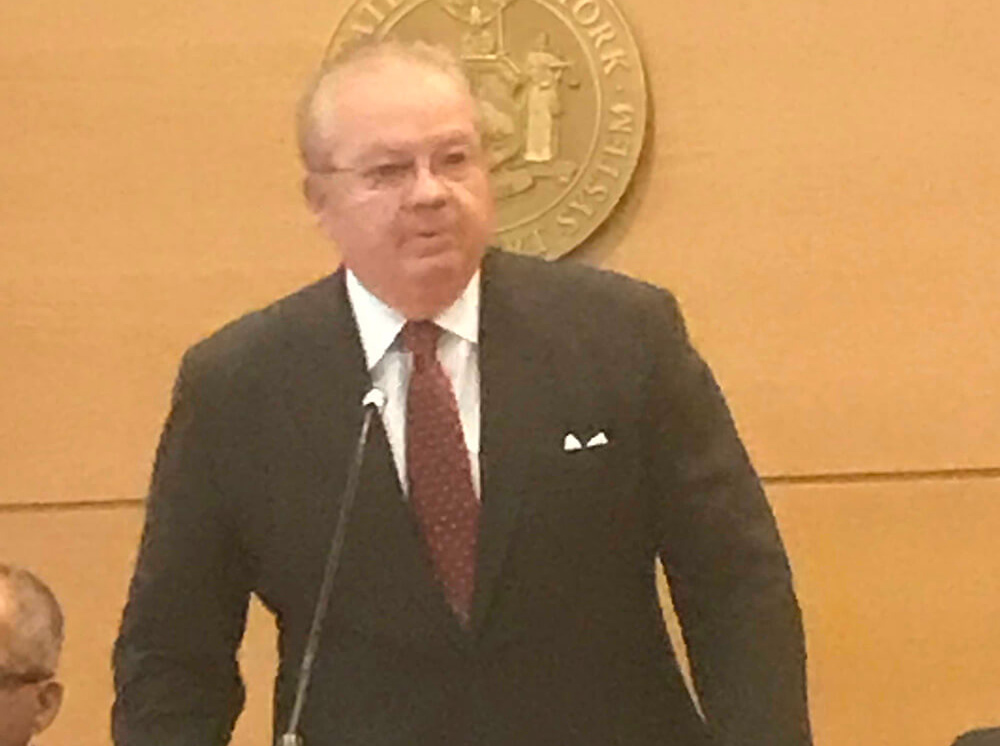The freedoms that most of us often take for granted or not fully realized in terms of just how important they to our daily existence were given a great deal of gravitas last Wednesday, May 8. Over 100 people gathered at Brooklyn Supreme Court on Jay Street in the downtown section of the County of Kings to attend the annual Law Day ceremony and seminar.
For those not in the know, President Dwight Eisenhower established the first Law Day in 1958 to mark the nation’s commitment to the rule of law. In 1961, Congress issued a joint resolution designating May 1 as the official date for celebrating Law Day, which is subsequently codified (U.S. Code, Title 36, Section 113). Every president since then has issued a Law Day proclamation on May 1 to celebrate the nation’s commitment to the rule of law.
In an official proclamation marking the day, President Trump said, “On Law Day, we renew our commitment to the rule of law and our Constitution. The rule of law requires that no one be above the obligations of the law or beneath its protections, and it stands as a bulwark against the arbitrary use of government power.
Each branch of the Federal Government takes an oath to uphold the Constitution and laws of the United States and thus is duty bound to the rule of law. That is why my Administration continues to fight the issuance of improper injunctions by Federal district courts, which enable a single district court judge to dictate law to the entire country and undermine the separation of powers.
We are also eliminating unnecessary and burdensome regulations to help limit the intrusion of unaccountable regulators into the lives of American citizens.
On this Law Day, I encourage all Americans to take time to express appreciation for how the rule of law helps protect our rights, including the freedoms of religion, speech, and the press. Today, we reflect on the many sacrifices our American forebearers made to secure and defend these rights for their posterity, and we aspire to be equally as dedicated to preserving them for future Americans.”
This year’s Law Day theme, “Free Speech, Free Press, Free Society” was described on the American Bar Association website. They said, “In the United States and around the world, freedom of speech and the press are among the most important foundations for a free society. Free speech and free press are prominent topics in public discourse and litigation. It is impossible to imagine a free society without these individual liberties, yet historical and current debates surrounding them continually challenge us to consider their boundaries and resilience. Changes in technology have reshaped how free speech and free press work in the everyday world.”
Among those addressing the assemblage in the jury room at Brooklyn Supreme Court on Jay Street were the Honorable Matthew J. D’Emic, the Administrative Judge for Criminal Matters in the Second Judicial District, the Honorable Lawrence Knipel, the Admniistrative Judge for Civil Matters in the Second Judicial District, Zachary W. Carter, the Corporation Counsel of the City of New York, David M. Chidekel, Esq, the president of the Brooklyn Bar Association and the former dean of Brooklyn Law School, the Honorable Nicholas W. Allard.
Among the special and honored guests was Democratic Party County leader, Frank Seddio, who also previously served as a New York State Assemblyman. Mr. Seddio sponsored the lavish luncheon that took place after the Law Day addresses.
In his featured remarks, Professor Allard drew attention to the steady erosion of our First Amendment rights, and the deep divisions that some postulate are in the process of tearing asunder the moral and legal fabric of American society.
“We are living in a time when our free, democratic civilized way of life based on law and justice faces severe threats on many fronts at home and abroad. It is a time when we cannot take for granted our freedoms, our security, or our pluralistic way of life in our great extraordinarily diverse country, “ declared Professor Allard.
In a voice reverberating with palpable emotion, Professor Allard inotned, “At stake is whether the fundamental values, norms, and institutions which are vital to empowering people and improving the human condition will continue to evolve and endure. Or instead, whether we will fall into a dark dystopian world dominated by power, violence, privilege, immorality, and chance.”
Speaking of the innate confidence that Americans had possessed in the constitution to guide us mightily through these most onerous of collective times as a nation, Professor Allard queried his audience of fellow law school professors, judges and members of the media. “Can we still be sure that our Constitutional system will work? You know what I mean. You can feel it, the relentless winds of politics, partisanship and self-interest spread seeds of doubt and despair about the future of our system of government and whether it will still work for us as it should, “ he said.
Amidst the dismal reality of our contemporary times, Professor Allard struck a sanguine note, replete with the kind of optimism that is the proverbial hallmark of the American spirit.
He said, “The answer is that there is nothing that we cannot handle, starting with every person in this room, if we adhere to the rule of law and assert our rights and responsibilities to hold government accountable. But, it takes work. If each of us sits back, expecting others to trigger the alarm or fight the fire, our house will burn down. The first responders are people exercising their free speech rights and journalists whose constitutional protected job is to pursue and reveal the truth, shine light into dark corners to give the public information it needs to make informed decisions and to hold the government accountable. In exercising of these rights and responsibilities, the work of Judges and lawyers to uphold the appropriate uses of free speech and free press rights is as important as it ever has been.”





